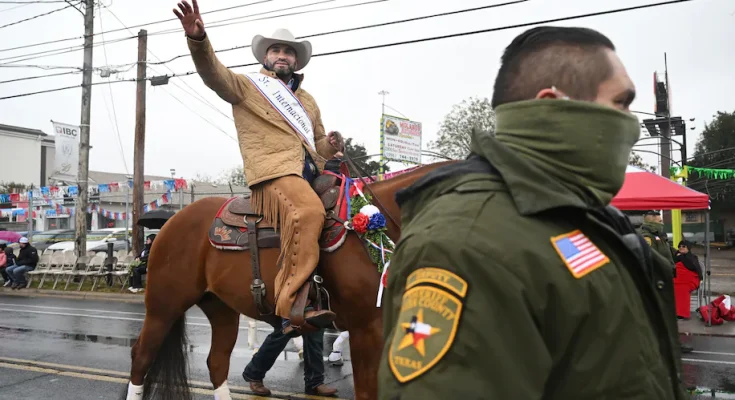Democrats’ hold over Texas border counties is waning, with rising stars like Tijerina switching parties and GOP candidates flipping traditionally blue seats. Political experts credit the resurgence of Donald Trump, as well as a huge influx of campaign dollars, and foresee a lasting shift that could have major implications in coming years.
“The Republicans have a great opportunity,” Tijerina said in late February. “There’s a lot of people like myself that are changing parties. You can change our minds.”

Trump was a decisive winner in South Texas in November’s presidential election, taking 14 of 18 counties within 20 miles of the border. In Webb — which, like most of the counties, is majority Hispanic — his margin of victory was 51 percent compared with 38 percent four years earlier.
“There is a moment where a threshold is crossed,” Corral said. “Where people are like, ‘Maybe it’s safe for me to come out as Republican. I will face less social ostracization. Enough people in my social circles will agree with me.’”
Rep. Monica De La Cruz, who in 2022 became the first Republican elected in her Rio Grande Valley congressional district, calls it “an awakening.” Last fall she won reelection by an even wider margin and watched state Sen. Adam Hinojosa flip a seat in similarly consequential fashion. He became the first Republican since Reconstruction to triumph in a legislative district extending from north of Corpus Christi to Brownsville.
“In the next several cycles, we’re going to see mayoral and commissioner seats flip,” predicts De La Cruz, who says she has heard from local Democratic officials likely to join the GOP soon.

“This area is blue collar, hardworking, humble individuals,” said De La Cruz, who believes the Republican Party better reflects their values these days — values based on “their faith, their family and their true love of country.”
In Hidalgo County — named for Miguel Hidalgo y Costilla, Mexico’s founding father — a county GOP meeting last week drew an overflow crowd. That included Gary Groves.
Groves, 69, retired from his oil and gas business and now serves as a Republican precinct chair. He has been organizing volunteer convoys known as Trump trains for the past five years. The next one is planned this month to show support for Trump’s billionaire adviser, Elon Musk, and the SpaceX headquarters that Musk located near Brownsville. Signs already posted there say “Thank you President Trump & Elon.”
Moderate Democrats running for office in coming years will face a reckoning, Groves said. “We need to hold them accountable and say, ‘How can you say you’re conservative when your party is going in a different direction?’”
Given the results of the last election, he’s confident: “There’s enough conservative Democrats who will vote Republican.”
The list of elected officials, both Hispanic and Anglo, who have gone from Democrat to Republican includes county attorneys, sheriffs and a county commissioner. All echoed Trump’s call for greater border security.
But Tijerina’s decision was the most significant, sending shock waves through the region. Soon after the three-term county judge made his announcement on Fox & Friends, Trump highlighted it online.
“Webb County Judge Tano Tijerina from the Great State of Texas switched his party affiliation from Democrat to Republican. In 2024, Webb County flipped from Blue to Red for the first time in over 100 YEARS!” Trump wrote in a post on his Truth Social site.

A Laredo native and former minor league baseball player, Tijerina returned home to ride rodeo, ranch and manage his family’s oil and gas interests. The father of five, who identifies as an antiabortion evangelical Christian, says the Democratic Party “left me a long time ago.”
“I’m a God-fearing man,” said Tijerina, 50, sitting in his office behind a massive wooden desk bearing his ranch’s brands. A tan cowboy hat adorned his head, and the gold and black Texas-size buckle on his belt was engraved with his title, a cross and “Giving God The Glory.”
“To see men playing in women sports, that took me back,” he explained. “God tells us to love everybody. LGBTQ, I will respect you. But don’t shove it down our throats.”
Tijerina acknowledged hearing from some constituents disappointed in his change of party. Others approached him at the grocery store to congratulate him on being brave enough to switch. Some Democrats told him they may switch parties, too, Tijerina said, and he told them how he feels freer to speak his mind.
“I’m just getting so many opportunities I never had before,” he said.
Tijerina just rode a horse in Laredo’s annual parade celebrating George Washington’s birthday. He was greeted with cheers.
“Puro amor,” he told the crowd, tapping his heart as he passed to signify that “pure love.”
Also cheered by parade spectators was U.S. Rep. Henry Cuellar, 69, a moderate Democrat whom Tijerina is considering challenging next year. The 11-term incumbent, along with his wife, has been charged with bribery, unlawful foreign influence and money laundering involving an Azerbaijan energy company. Both have denied wrongdoing. A federal trial is set for the fall.
Cuellar’s Democratic primary opponent last year accused him of supporting Trump policies. “They called me Trump’s favorite Democrat,” he recounted. “Instead of running against those attacks, I actually dug in, defending the Second Amendment, pro-life, oil and gas.”

He views the president’s increased support in border counties as “a warning” to the national Democratic Party “that we can’t lose Hispanics. We better start talking to them on issues that are important to them.”
Opinions differ on what those issues are.
Corral, the political science professor, identifies economic concerns as voters’ primary motivator.
“The Rio Grande Valley and South Texas generally is an area that has a lot of economic struggle and a lot of economic inequality. The recent inflationary pressures really disproportionately hit Latinos in areas that have seen decades-long deinvestment,” he said. “Just securing the basics of survival is really hard in the Rio Grande Valley and South Texas.”
Webb County Democratic Party Chair Sylvia Bruni faults Tijerina for leaving the party but also state party leaders for failing to better support local candidates’ campaigns.
“They absolutely abandoned South Texas — funding, resources, staffing,” she said.
No question that Democrats were greatly outspent in key state districts across the region during the last election cycle.
Musk donated $1 million to Texans for Lawsuit Reform, one of the main political forces backing Republicans in battleground legislative races. During a three-month period, the party raised more than $1 million for GOP challengers in three South Texas races, compared with Democrats’ $243,000. And leading up to the election, the Trump-allied organization America First and conservative Hispanic outreach groups targeted voters here with text messages, phone calls, surveys and door knocking.
Two of the Republicans won. The third lost by a slim margin.

Bruni believes her party’s voters aren’t really turning red — they’re just being wooed better by Republican canvassers with false promises. “This is the way I see it devolving if we don’t get help,” she said.
Yet Jorge Martinez, national director of Hispanic outreach at the America First Policy Institute, says South Texas has been transformed from “a Democratic stronghold.” The organization’s surveys last year showed that Hispanic voters connected with Republican candidates on issues such as securing the border, fighting inflation, lowering energy costs and “preserving the values of faith, family and freedom,” he said.
“More and more Hispanics feel those common shared values are threatened by a progressive liberal agenda,” Martinez added. “We are not merely gaining votes: We are capturing hearts and minds.”

